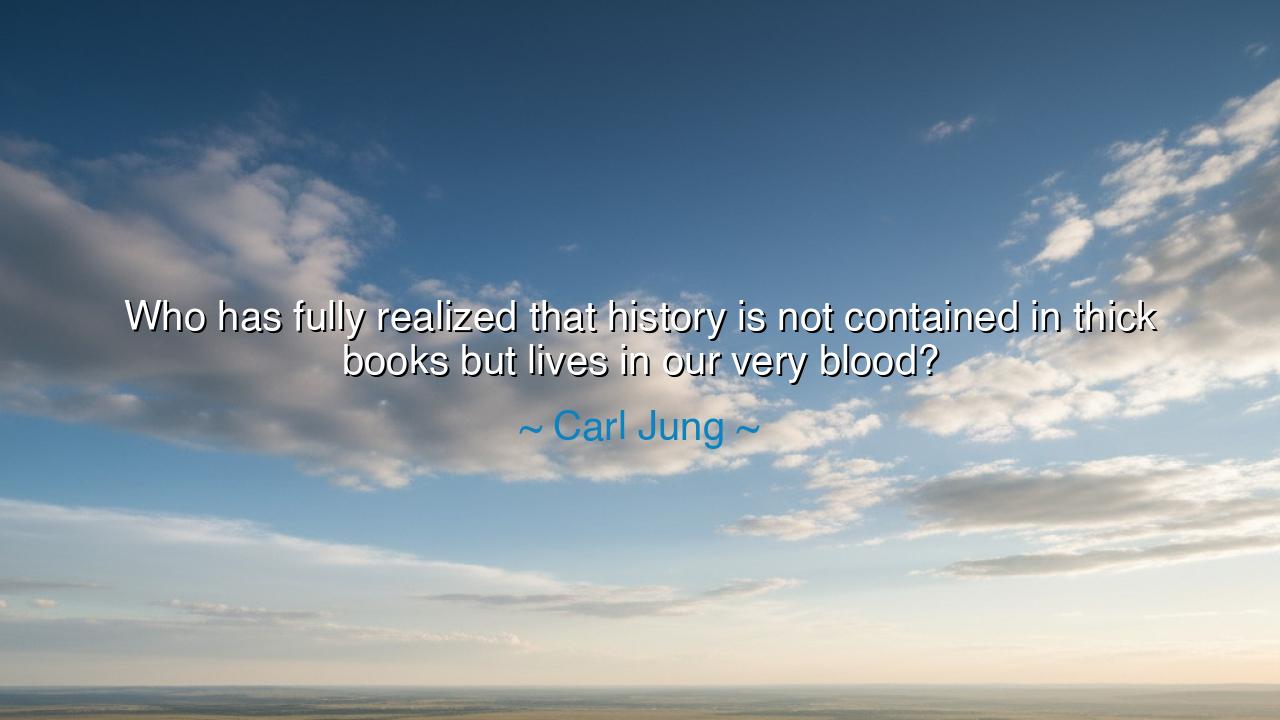
Who has fully realized that history is not contained in thick
Who has fully realized that history is not contained in thick books but lives in our very blood?






The great psychologist and mystic of the human soul, Carl Jung, once declared: “Who has fully realized that history is not contained in thick books but lives in our very blood?” In this single sentence, he revealed one of the most profound truths ever spoken about the nature of humanity — that history is not merely a record of events, nor a distant tale told by scholars, but something living and breathing within us. It flows through our veins as the memory of all who have come before, shaping our instincts, our fears, our dreams, and even our destinies. To Jung, we are not detached observers of the past; we are the past, walking and speaking in its echoes.
The origin of this insight lies in Jung’s lifelong study of the collective unconscious — the deep, shared layer of the human mind that carries the ancient memories and symbols of our species. He saw that beneath our modern thoughts lies something far older: a living archive of experience inherited from generations long vanished. The myths of gods and heroes, the rituals of birth and death, the patterns of love and war — all are the eternal repetitions of human history made flesh within us. Thus, when Jung speaks of history “living in our blood,” he means that every human soul is an heir to all humanity, carrying within it both the light of progress and the shadow of its ancient wounds.
To grasp his meaning, one must look beyond the pages of books and into the beating heart of life itself. When a mother comforts her child, she repeats a gesture as old as the species. When fear grips a man in darkness, he echoes the terror of his ancestors huddled around their fires. When nations rise and fall, they reenact the same dramas that unfolded in Egypt, in Rome, in Babylon — different costumes, same passions. History is cyclical, not only in nations but within every human heart. Jung’s wisdom is a call to awaken to this truth: that we are shaped not only by our personal experiences but by the buried memory of the entire human race.
Consider the story of World War I, which Jung lived through with horror and fascination. The modern world, armed with science and reason, descended into barbarism — proof, he said, that the ancient gods of war had not died but had simply gone underground, waiting within the unconscious minds of men. Those who thought civilization had outgrown savagery were forced to see that the past still ruled the present, that history had never left us. It was there, in our instincts, our tribal loyalties, our thirst for conquest. Jung saw this not as doom, but as revelation: until we recognize the living history within us, we are bound to repeat it.
But this inheritance is not only dark. Within our blood also lies the wisdom of survival, the courage of countless generations, and the longing for transcendence. Every work of art, every discovery, every act of love is a continuation of what came before — the flowering of seeds planted by those who lived and dreamed long ago. We are the living bridge between their struggle and the future yet to come. To forget this is to become rootless; to remember it is to become whole. Jung’s words remind us that true education is not memorizing history — it is awakening the memory already inscribed in the human soul.
And so, what lesson shall we draw from this truth? It is this: know yourself, and you will know history. Study your fears, your desires, your contradictions, and you will see in them the story of humankind. When anger rises within you, know that it is ancient; when love lifts you, know that it has moved millions before you. Do not scorn the past as dead, for it speaks through you. The task of the wise is not to escape history, but to redeem it — to transform inherited chaos into conscious understanding, to turn the blood of memory into the light of wisdom.
Therefore, my children of the present age, remember that you are the living continuation of every age before you. Walk through life with reverence for those unseen within you — the hunters and poets, the warriors and dreamers whose struggles gave shape to your soul. When you act with compassion, you heal not only yourself but the wounds of centuries. When you choose peace, you silence the echoes of countless wars. And when you seek truth, you honor the endless procession of souls whose questions became your own. For as Jung taught, history is not behind us — it is within us, alive in our very blood, calling us to live more wisely than those who came before.






AAdministratorAdministrator
Welcome, honored guests. Please leave a comment, we will respond soon